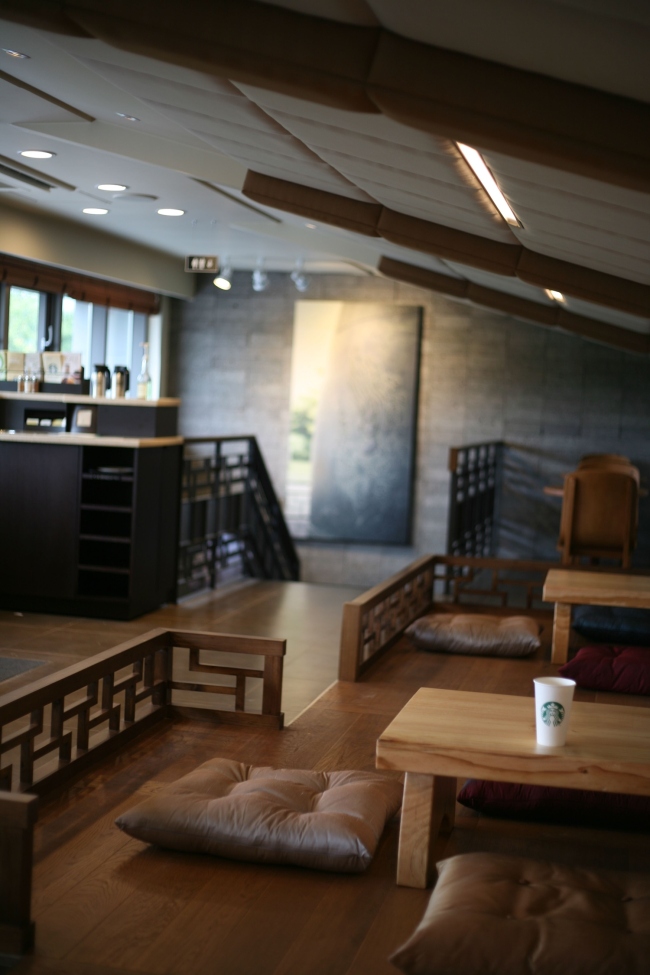차분한 한국의 전통찻집 분위기로 꾸며져 있는 경주의 스타벅스 보문로점 2층 다락방.
손님들은 나무로 된 마루 위 방석에 앉아 커피를 마시고, 벽에는 신라시대 문화재 디자인이 가득하다.
안압지 난간을 응용한 계단 난간, 2층 다락방 형태의 좌식 공간 및 첨성대, 불국사, 성덕대왕 신종 등 독특한 한국적 디자인을 매장 곳곳에 반영했다.
“9월 10일 경주 보문관광단지에 국내에서는 최초로 개점한 드라이브 스루 매장은 이처럼 경주를 찾는 국내외 관광객들에게 찬란한 신라 문화 유산과 첨단의 글로벌 커피 문화가 어우러지는 특별한 스타벅스 경험을 제공할 수 있게 됐다.”고 스타벅스 관계자는 말한다.
스타벅스 보문로점에서는 또한 국내 IT 기술진이 자체 개발한 첨단 화상 주문 시스템을 통해 자동차 안에서 커피 주문이 가능하다. 차량을 이용하는 고객들은 42인치 대형화면을 통해 바리스타들과 대화를 나누며 주문하고, 전체 메뉴를 편리하게 검토하며, 각자의 주문 내역을 상세히 확인할 수 있다.
스타벅스 외에도 한국시장에서 성공적으로 정착하고 성장해 온 글로벌 기업들은 다양한 토착화 전략을 선보여 왔다.
맥도날드 코리아는, 야식 문화와 배달 문화가 발달된 한국인의 생활 패턴에 맞춰 24시간 운영하는 매장과 배달서비스인 맥딜리버리(McDelivery)를 각각 2005년과 2006년에 업계 최초로 도입해 매출 신장을 이끌었다.
한국에서 가장 잘 팔리는 수입차 브랜드 BMW는 전세계 최초로 한국에서만 사회공헌재단인 미래재단을 설립해 기부자 고객을 대상으로 자선 콘서트, 기부 경매, 친환경 캠페인, 다양한 어린이 대상 교육 캠프를 진행해 왔다.
<관련 영문 기사>
Global companies sport localization strategies to win Korean hearts
By Kim So-hyun
It is a serene atmosphere with a Korean traditional teahouse-like interior where people sit down on top of flat cushions on a wooden floor.
But the drinks served are Starbucks coffee.
Korea’s first drive-through Starbucks opened in Gyeongju, capital of the ancient kingdom of Silla, in September, with Silla designs everywhere.
The stair railing to the traditional tearoom on the upper floor is designed after the banisters around the historic Anapji pond where the royals and the upper class partied during the Silla era.
Pictures of historical relics such as the Cheomseongdae observatory, Bulguksa temple and the Sacred Bell of the Great King Seongdeok adorn the walls.
Outside, customers can order drinks from their cars using a 42-inch video screen system developed by Starbucks Korea.
“Tourists from in and out of Korea visiting Gyeongju are offered a special Starbucks experience combining the cultural heritage of Silla with cutting-edge, global coffee culture,” said Starbucks Korea spokesman Park Han-jo.
To celebrate the opening of the Bomunro store in Gyeongju, located near the Bomun Lake, the Korean arm of the global coffeehouse chain launched a fund-raising campaign to protect the region’s cultural relics.
The 400th Starbucks store in downtown Seoul’s Ima Building, where the royal stables were located during the Joseon era, is decorated with historical paintings chosen using information from national museums and advice from the Cultural Heritage Administration.
Like Starbucks, global companies that have successfully settled down and grown in Korea are using various localization strategies in terms of marketing, sales and after-sales services to maintain customer loyalty and build a positive brand image.
They introduce products and services that are only available in Korea to meet the specific tastes of local customers and trot out localized campaigns that cater to the latest social needs.
McDonald’s Korea, for instance, was the first in the industry to open 24-hour stores in 2005 and begin delivery service in 2006 as part of efforts to tailor to the local lifestyle of enjoying late-night snacks and delivery food.
As of late last month, customers in Korea can also order McDelivery online.
“Sales have grown each year since we started running the 24-hour stores and the McDelivery service,” said a public relations official of McDonald’s Korea, adding that several rival companies have since followed suit.
The world’s largest hamburger chain also sells localized menu items in Korea, like the bulgogi burger and Shanghai spice chicken burger, which became two of the most popular items here along with the Big Mac.
McDonald’s localized menus are successful around the world -- “McVeggies” with patties made of vegetarian ingredients and Indian spices in India; breakfast menu “Hamdesal,” a Philippine bread named pandesal with pineapple sauce, bacon and cheese in the Philippines; and “McBaguette” in France.
BMW, the best-selling import car brand in Korea, launched a nonprofit foundation for social contribution here in 2011 for the first time in the world.
“The ’BMW Korea Future Fund’ holds charity concerts for donor customers, charity auctions, environment-friendly campaigns in cooperation with the government and other nonprofit organizations, in addition to educational camps for schoolchildren,” BMW Group Korea spokesman Pyo Sung-hyun said.
The BMW fund also sponsored a high-tech venture contest for university and graduate school students seeking to become entrepreneurs.
BMW also organized a group of 100 customers to evaluate the company’s service, and opened an online hotline for customer service in addition to its communication call center, exclusively in Korea.
(
sophie@heraldcorp.com)







![[Today’s K-pop] Blackpink’s Jennie, Lisa invited to Coachella as solo acts](http://res.heraldm.com/phpwas/restmb_idxmake.php?idx=644&simg=/content/image/2024/11/21/20241121050099_0.jpg)
